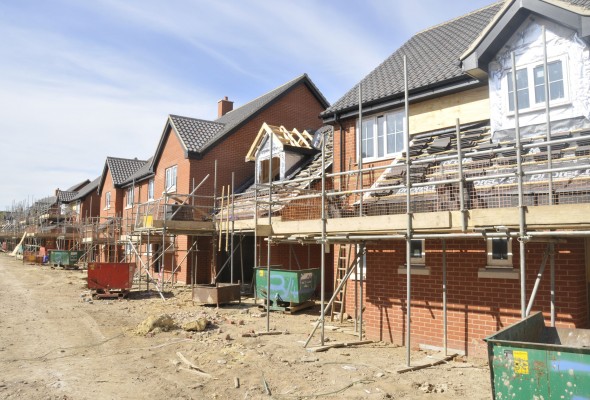Public authorities would be allowed to seize land under the “Public Land Value Capture” proposal suggested by the think tank Common Weal. In short, public authorities should have the legal means to purchase land at the existing “use value” rather than at the anticipated future value once planning permission is granted (known as ‘hope value’).
Public authorities would borrow against the future uplift (upswing) in land value from the granting of planning permission to develop the site. This borrowed sum could then be used to fund the master-planning, infrastructure and construction of public-rental housing, while some plots could be sold-off to the private sector at a profit. Either way, the reductions in land costs would eliminate land speculation in the development process and increase the affordability and quality of housing development.
What a grand idea! Let’s do it!
Not so fast
A major reason for the housing prices is overregulation and the difficulty of getting building permits. There are planning and zoning laws, building codes, height restrictions and greenbelt policies to restrict the supply. There are help-to-buy schemes, low interest rates, tax privileges for mortgage holders and other policies to drive demand through the roof. Landlord registration, stamp duty and HMO licensing limiting the number of people who can share a flat push up the price of renting to the sky. And so on and so forth.
That’s why building land ends up being so expensive. And that’s also why those darned developers are making a lot of money – but it’s not money for nothing – otherwise everybody would be jumping in on investing into land!
Let’s take a little peek at the planning performance of the local authorities: http://www.gov.scot/Topics/Statistics/Browse/Planning/Publications/planapps2017annual
For “local” developments, the average time was in the last year about 12 weeks. 3 months will be spent on haggling with the council whether you can build on your land, hoping for the best. That’s not too bad although the time can easily climb to 30 weeks and more, the better part of the year.
For “major” developments, the average time was about 45 weeks, easily a year and sometimes two. (All of these are averages so who knows what extremes hide behind them – at the top is Midlothian with 5 developments and an average time of 96.2 weeks.)
These are just the times spent on the permit itself, not preparing the papers or anything else. If you want to build and you find a piece of land, you still have to wait for months or years for the permit.
The elephant in the planning room
But let’s get rid of a moral issue first: the kind and gentle ability to “compulsory purchase land at existing use value” is nothing else but the power to expropriate. The unfortunate victims of this landgrab will be reimbursed – but don’t expect them to make profit out of their own land or being able to stay on it.
The paper perversely quotes a planning academic: “planning permission is a public gift, restoring to applicants the right to develop land when it is clear that this is in the public interest. Any increase in land values is also therefore the property of the community”. The right to develop your own land was taken away and when and if it is most graciously returned, it is to be considered a gift! Any increase in value for having to go through the bureaucratic hell is to be taken away as well.
However, the paper strangely forgets that this very law proposal will do away with “applicants” – the purchases will be compulsory. What a tragic attitude in a land that has suffered the Clearances!
This introduces a great motivation for the council to find potentially profitable land, buy it for cheap, kick out the people owning it and sell it off.
It’s all for the good of the people.
Why don’t we just let councils invest?
Public authorities can already invest and if they build more new houses for cheap, what’s the problem?
After all, the process will be based on a careful analysis and with due public consultation… meaning it can take years before even getting to the permit stage. One can only hope that CommonWeal takes these costs into account.
Worse, the council will have to go through the same long permission process as the developers. The paper seems to assume these costs away for some reason. If getting a permit is a simple affair, clearly the greedy developers oriented on a quick buck are doing something wrong. Or maybe the councils are wasting everybody’s time – but let’s think positively.
If the permission process takes months or years, the council will have to jump through the same hoops and expend similar amounts of money as the developers. That assumes the bureaucrats will be efficient and they won’t make the process even slower but let’s remain positive.
This is supposed to be an “extremely safe investment”, as long as the planning permission is granted. If the council does everything as it should, this extremely safe investment will be as speculative as that of those tricky developers. If the application fails, the council will be stuck with the loan. If the costs end up being too high, the council may lose out on the whole deal. That’s how investment works.
Introducing moral hazard
Of course, the council could find it very easy to get a planning permission – after all it’s granting the permission to itself! Since large amounts of money and political futures will be on the line, the council will be strongly motivated to make sure any permits are quick and painless.
This is not a problem if it’s just pointless bureaucracy. But if giving a permission is really such an incredibly valuable and arduous process for a good reason, the council will be motivated to skip all those environmental checks or listening to those pesky citizens, who rarely seem to want new construction. Because now, the council is a profit-hungry developer, too. And it doesn’t need to ask anybody for the land. It can just take it. For a reasonable price, you know.
How will this work out in practice?
The hostile competition option or how to ruin a market
The council will be competing with developers on a market with a limited supply of land. But the council doesn’t have their limitations – it can pick and choose pretty much any land it declares to be useful to itself (a “simplified development zone”). The council could in fact take over any land that is under development. Wherever developers find a good spot the council can just march in and destroy their investment.
Landowners will suffer from an additional source of uncertainty. What if your council decides that it wants your land? What if it just “starts planning”? Who in their right mind would build anything on their land or invest in it if it can be taken overnight – or five years later?
But this is only the small and medium-sized landowners and developers. The large companies and owners – and especially the politically well-connected ones – won’t have a problem with the council. This will lead to more centralisation in the housing market and more entanglement in bureaucracy.
And house prices will go even higher.
The friendly competition option – or how to make lots of money with corruption
But why can’t they all just be friends? The developers don’t need to fear the council. In fact, they can use the council to help them to invest.
The developers will pick and choose a good spot for new housing construction. They don’t need to restrict themselves to landowners who want to sell or offer them more money. The council will work its magic and remove all obstacles – people, properties, paperwork. Then it will sell the land back to the developers who will save time and money on permits and negotiations. The more useful councillors will be invited to give a presentation in Tahiti and everybody will be happy.
Except for the people that wanted to keep their land or make something out of it. Never mind that. Victory for the big guys!
But there’s more. Sub-contracting will “possibly be a procurement process” whereby contracts are given on a case by case basis and with specific contractual requirements for build design and quality. Although this is claimed to benefit small and medium sized businesses, the “specific contractual requirements for build design and quality” will probably mean that only large companies will be able to fulfil them.
Who knew Public Land Value Capture could be so useful? Big developers will be sure to line up to support CommonWeal and their proposal!
Peter Sidor works in IT and lives in Edinburgh. In his spare time he rants about the future of freedom across the world.





A comprehensive demolition of a stupid idea. It’s depressing that I can easily imagine our lords and masters at Holyrood taking such a patently ruinous suggestion seriously. Along with all the harebrained schemes they’ve already implemented (to much self-congratulation), I genuinely fear for Scotland’s future. Edinburgh, the Athens of the North indeed.
These sort of proposals are where fascist economics & feudalism intersect (something I often say about Georgism & LVT as it happens).
> Edinburgh, the Athens of the North indeed.
Soon to be the Pyongyang of the North quite possibly.